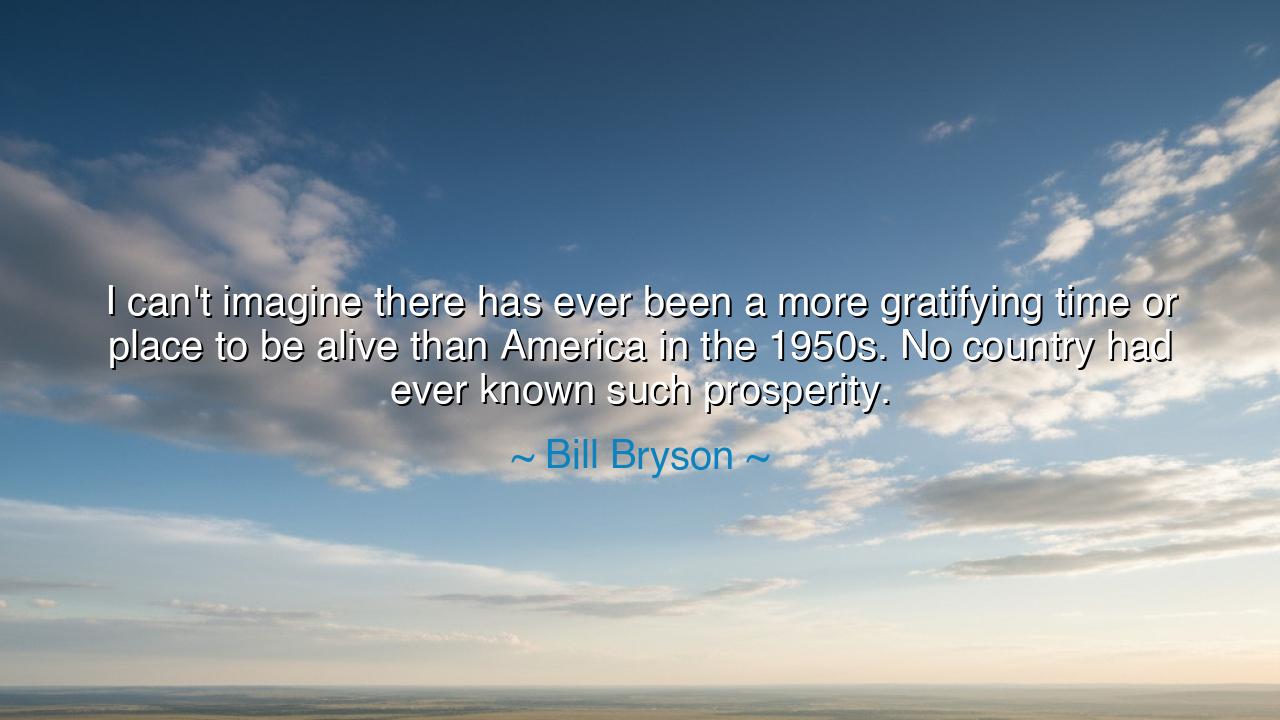
I can't imagine there has ever been a more gratifying time or
I can't imagine there has ever been a more gratifying time or place to be alive than America in the 1950s. No country had ever known such prosperity.






The words of Bill Bryson, “I can’t imagine there has ever been a more gratifying time or place to be alive than America in the 1950s. No country had ever known such prosperity,” are a meditation upon a season of abundance, a reflection on an age when comfort, confidence, and stability seemed to flow like a river across a nation. In these lines, Bryson captures the spirit of the post-war boom, when the wounds of conflict had begun to heal, and the rewards of peace bore fruit in households, industries, and communities. His words are both nostalgic and instructive, reminding us that there are rare moments in history when circumstances align to give a people extraordinary flourishing.
At its heart, this quote speaks to the nature of prosperity. After the Great Depression and the trials of World War II, Americans entered a decade of unprecedented growth. Wages rose, homeownership expanded, highways stretched across the land, and consumer goods filled the homes of families who had once known scarcity. There was a sense of confidence that the future could only grow brighter. Bryson’s reflection is not merely about material wealth, but about the gratification that comes when a society feels secure, unified, and forward-looking.
The origin of this statement lies in Bryson’s own upbringing. Born in 1951, he grew up amid the optimism of that decade. His memory is filled with the simple joys of the age: suburban neighborhoods bustling with children, families gathered around the new marvel of television, and the steady hum of factories that seemed to promise jobs for all. For him, the 1950s were not abstract history, but lived experience—a time when America stood at the height of confidence, its citizens buoyed by victory in war and the promises of innovation.
History supports his observation. Consider the GI Bill, which provided millions of returning soldiers with education and affordable housing, fueling a new middle class. Or the building of the Interstate Highway System, which stitched the nation together and made travel, commerce, and connection easier than ever before. Companies like General Motors and Ford symbolized American industrial might, while inventions such as the polio vaccine brought health and hope. These were not small gains, but monumental shifts that elevated daily life for millions.
And yet, the wisdom of Bryson’s words must also be weighed against the shadows of the time. While many experienced this era as an age of gratification, not all were included in its bounty. For African Americans, women, and other marginalized groups, the 1950s were marked by systemic inequality and exclusion. The prosperity was real, but it was not universal. This truth does not diminish Bryson’s observation, but deepens it, reminding us that every golden age is also a call to remember who was left outside its gates.
The deeper teaching, then, is twofold. First, it is a reminder of the power of prosperity to uplift the spirit of a people, giving them confidence, creativity, and stability. Second, it is a caution that prosperity must be shared, lest it become a gilded age that shines for some while remaining dim for others. True gratification arises not only from wealth, but from justice and inclusion. Bryson’s reflection points us to the heights America achieved, but wisdom compels us to ask how such abundance can be extended to all.
To the seekers of wisdom, let this truth be your guide: every age of prosperity is both a blessing and a responsibility. Enjoy its fruits, but do not become complacent. Ask who has been left out, and work to open the gates wider. Remember that gratification is sweetest when it is shared, and prosperity is most enduring when it lifts every citizen.
Thus, let Bryson’s words endure as both remembrance and lesson: the 1950s in America were a time of unmatched prosperity, but they remind us of the fleeting nature of such seasons. Prosperity must not be squandered, nor hoarded, but tended like a flame. For the true measure of a nation is not only how high it rises, but how widely it spreads its light.






AAdministratorAdministrator
Welcome, honored guests. Please leave a comment, we will respond soon